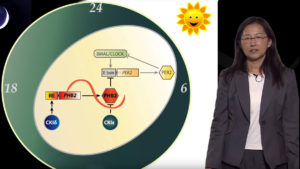By studying families with sleep/wake disorders, Fu and Ptáček have shown that mutations that cause changes in the phosphorylation or acylation of the PER2 protein are responsible for regulating circadian rhythms.
Ptáček introduces the circadian clock and its relationship to sleep. He describes different sleep-wake behaviors including people who go to sleep and awaken exceptionally early or late. By studying families with an advanced sleep phase (ASP) phenotype, he and his colleagues showed that these individuals had a shortened circadian period. Further studies of families with similar sleep-wake behaviors have identified a number of mutations responsible for circadian rhythm regulation.








